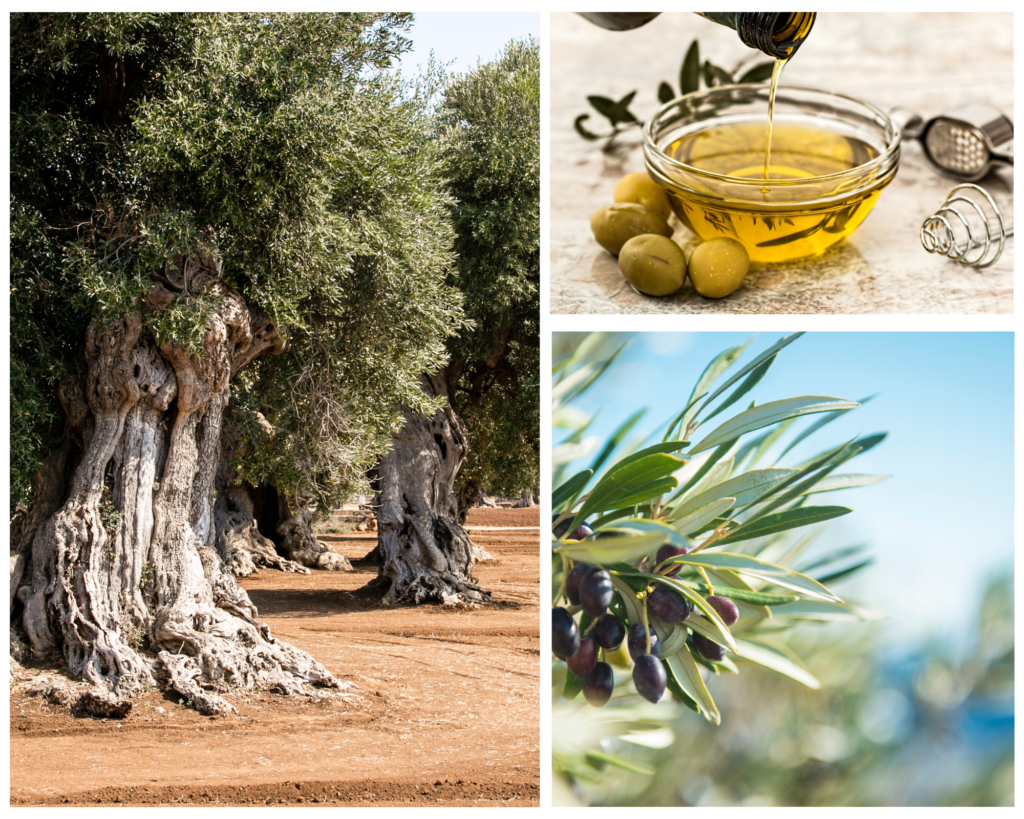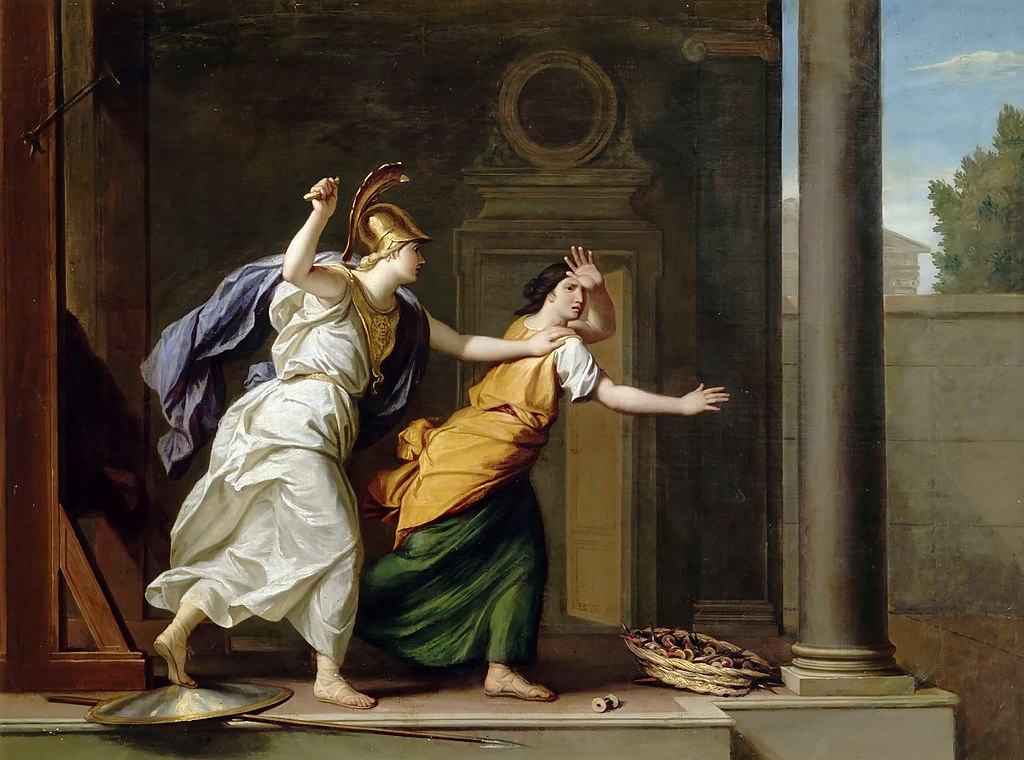CHAPTER IV
THE BIRTH OF ATHENE
One day Zeus was ill. To us it is strange to think of the gods as suffering the same pains as mortals suffer, but to the Hellenes it seemed quite natural.
Zeus was ill. His head ached so severely that he bade all the gods assemble in Olympus to find a cure for his pain. But not one of them, not even Apollo, who was god of medicine as well as Sun-god, could ease the suffering deity.
After a time Zeus grew impatient with the cruel pain, and resolved at all costs to end it. So he sent for his strong son Hephaestus, and bade him take an axe and cleave open his head.
Hephaestus did not hesitate to obey, and no sooner had the blow descended than from his father’s head sprang forth Athene, the goddess of war and wisdom. She was clad in armour of pure gold, and held in her hand a spear, poised as though for battle. From her lips rang a triumphant war-song.
The assembled gods gazed in wonder, not unmixed with fear at the warrior goddess, who had so suddenly appeared in their midst. But she herself stood unmoved before them, while a great earthquake shook the land and proclaimed to the dwellers in Hellas the birth of a new god.
Athene was a womanly goddess as well as a warlike one. She presided over all kinds of needlework, and herself loved to weave beautiful tapestries.
Soon after the birth of the goddess a man named Cecrops came to a province in Greece, which was afterwards known12 as Attica. Here he began to build a city, which grew so beautiful beneath his hands that the gods in Olympus marvelled. When it was finished, each of the gods wished to choose a name for the city Cecrops had built.
As only one name could be used, the gods met in a great council to determine what was to be done. Soon, one by one, each gave up his wish to name the city, save only Athene and Poseidon.
Then Zeus decreed that Athene and Poseidon should create an object which would be of use to mortals. To name the city and to care for it should be the prize of the one who produced the more useful gift.
Poseidon at once seized his three-pronged fork or trident, which was the sign that he was ruler of the sea. As he struck the ground with it lo! a noble horse sprang forth, the first horse that the gods had seen.
As Poseidon told the gods in how many ways the beautiful animal could be of use to mortals, they thought that Athene would not be able to produce anything that could help men more.

When she quietly bade the council to look at an olive-tree, the gods laughed her to scorn. But they soon ceased to laugh. For Athene told them how the wood, the fruit, the leaves, all were of use, and not only so, but that the olive-tree was the symbol of peace, while the horse was the symbol of war. And war did ever more harm than good to mortals.
So the gods decided that it was Athene who had won the right to name the city, and she gave to it her own name of Athene, and the citizens ever after worshipped her as their own peculiar goddess.
Of this city, which we know as Athens, you will hear much in this story.
13

Minerva and Arachne, René-Antoine Houasse, 1706
CHAPTER V
THE TWO WEAVERS
Athene could not only wield the sword, she could also ply the needle.
In these olden days there lived in Greece a Lydian maid who could weave with wondrous skill. So beautiful were the tapestries she wrought that her fame spread far and wide. Lords and ladies both came from distant towns to see the maiden’s skillful hands at work.
Arachne, for that was the maiden’s name, lived in a cottage with her parents. They were poor folk, and had often found it hard to earn their daily bread. But now that their daughter was famous for her embroidery their troubles were at an end. For not only lords and ladies, but merchants, too, were glad to pay well to secure the young maid’s exquisite designs.
And so all would have been well with Arachne and her parents had not the foolish girl become vain of her work. Soon her companions began to weary of her, for of nothing could she talk save of her own deft fingers, of her own beautiful embroideries.
Those who loved Arachne grew sad as they listened to her proud words, and warned her that ‘pride ever goes before a fall.’
But Arachne only tossed her pretty head as she listened to the wisdom of older folk. Nor did she cease to boast, even saying that she could do more wonderful work than the goddess Athene.
Not once, but many times did Arachne say that she14 wished she might test her skill against that of the goddess. And should a prize be offered, proudly she declared that it was she who would win it.
From Olympus Athene heard the vain words of the maid. So displeased was she with her boldness that she determined to go to see Arachne, and if she did not repent to punish her.
She changed herself into an old white-haired dame, and came to earth. Leaning upon a staff she knocked at the door of the cottage where Arachne lived, and was bidden to enter.
Arachne was sitting in the midst of those who had come to see and to praise her work. Soon she began to talk, as she was quick to do, of her skill, and of how she believed that her work surpassed in beauty any that Athene could produce.
The old woman pushed her way through the group that surrounded the maid, and laying her hand upon the shoulder of Arachne she spoke kindly to her.
‘Be more modest, my child,’ she said, ‘lest the anger of the gods descend upon you, lest Athene take you at your word, and bid you to the contest you desire.’
Impatiently Arachne shook off the stranger’s hand, and answered, ‘Who are you who dare speak to me? I would Athene might hear my words now, and come to test her skill against mine. She would soon see that she had a rival in Arachne.’
Athene frowned at the insolence of the maiden. Then the little company were startled to see the old woman suddenly change into the glorious form of the goddess Athene. As they gazed they were afraid and fell at her feet.
But Arachne did not worship the goddess. Foolish Arachne looked boldly in her face, and asked if she had come to accept her challenge.
Athene’s only answer was to sit down before an empty15 loom. Soon each, in silence, had begun to weave a wondrous tapestry.
Swift and more swift moved the fingers of the weavers, while the group of strangers, gathered now near to the door, watched the webs as they grew and grew apace.
Into her tapestry Athene was weaving the story of her contest with Poseidon for the city of Cecrops. The olive-tree, the horse, the gods in the council, all seemed to live as they appeared on the web of the goddess.
The tapestry woven by Arachne was also beauteous as her work was wont to be. In it you saw the sea, with waves breaking over a great bull, to whose horns clung a girl named Europa. And Europa’s curls blew free in the wind.
At length Athene rose from the loom, her work complete. Arachne, too, laid down her spindle, and as she turned to look upon the tapestry of the goddess her courage suddenly failed.
A glance had been enough to show her that her skill was as nothing before the wonder and the beauty of Athene’s work.
Too late the maiden repented that she had defied the goddess. In her despair she seized a rope and tied it round her neck to hang herself.
But the goddess saw what Arachne meant to do, and at once she changed her into a spider, bidding her from henceforth never cease to spin.
And so when you see a spider weaving its beautiful embroidery on a dewy morning in the garden, or when you find a delicate web in your lumber-room, you will remember how Athene punished poor foolish Arachne in the days of old. 16 by Mary MacGregor
MacGregor, Mary. The Story of Greece. London, T. C. and E. C. JACK, Ltd., 1914.